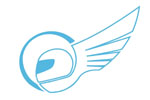
Beleuchtungskonzepte für Motorräder

Summary from FEAST:
Powered Two Wheeler (PTW) users are greatly over-involved in serious and fatal crashes. They have between 5 and 25 times the risk of having a fatal crash compared to car drivers, depending on the country. The number of PTWs on European roads has more than doubled over the last two decades. The recent MAIDS (Motorcycle Accident In-Depth Study) study of PTW crashes in Europe found that behavioural and ergonomic issues were major contributing factors to PTW crashes: the primary accident cause for PTW crashes was the failure of drivers to perceive two-wheelers; and human error was a major contributing factor to most crashes, for both PTW and car drivers.
The majority of PTW crashes involved a collision with a car. Many large-scale research programs have been undertaken to understand the behavioural and ergonomic factors that contribute to crashes involving 4-wheeled vehicles. These have been effective in informing countermeasure development, which has led to significant reductions in crashes. To our knowledge, no comparable human factors and behavioural research programs have been initiated in the PTW domain, in Europe or elsewhere. The high rate of motorcycle-related deaths and injuries calls for new and refined countermeasures, deriving from solid behavioural and ergonomics research. In this proposal we outline an innovative program of research, involving partners from Europe, Israel and Australia, that directly targets those behavioural and ergonomic factors cited in the MAIDS study as contributing to PTW crashes.
This includes research on crash causes and human error, the worlds first naturalistic riding study involving instrumented PTWs, research on motorcycle rider risk awareness and perception, the development of new research tools to support the research program, in-depth research on the factors that underlie driver failures to see PTWs and their riders, and the development of recommendations for practical countermeasures for enhancing PTW rider safety.
Participants:
API SA FRANCE
MONASH UNIVERSITY AUSTRALIA
FEDERATION OF EUROPEAN MOTORCYCLIST‘ ASSOCIATIONS BELGIUM
CENTRUM DOPRAVNIHO VYZKUMU V.V.I. CZECH REPUBLIC
FACULDADE DE MOTRICIDADE HUMANA PORTUGAL
INSTITUT NATIONAL DE RECHERCHE SUR LES TRANSPORTS ET LEUR SECURITE FRANCE
EPITROPI EREUNON PANEPISTIMIOU THESSALIAS GREECE
O“STERREICHISCHES FORSCHUNGS- UND PRU“FZENTRUM ARSENAL GES.M.B.H. AUSTRIA
FACTUM CHALOUPKA & RISSER OHG AUSTRIA
CENTRE EUROPEEN D’ETUDES DE SECURITE ET D’ANALYSE DES RISQUESC.E.E.S.A.R.ET D’ANALYSE DES RISQUES FRANCE
CENTRE FOR RESEARCH AND TECHNOLOGY HELLAS GREECE
BEN-GURION UNIVERSITY OF THE NEGEV ISRAEL
UNIVERSITA DEGLI STUDI DI PADOVA ITALY
FUNDACION CIDAUT SPAIN
UNIVERSITA DEGLI STUDI DI FIRENZE ITALY
NATIONAL TECHNICAL UNIVERSITY OF ATHENS GREECE
VALTION TEKNILLINEN TUTKIMUSKESKUS FINLAND
INSTITUTE OF COMMUNICATION AND COMPUTER SYSTEMS GREECE
KURATORIUM FUER VERKEHRSSICHERHEIT – KFV AUSTRIA
TECHNISCHE UNIVERSITAET DRESDEN GERMANY
UNIVERSITAET WIEN AUSTRIA
UNIVERSITA DEGLI STUDI DI MODENA E REGGIO EMILIA ITALY
PIAGGIO & C S.P.A. ITALY
TRL LIMITED UNITED KINGDOM
THE UNIVERSITY OF NOTTINGHAM UNITED KINGDOM
BUNDESANSTALT FUER STRASSENWESEN GERMANY





